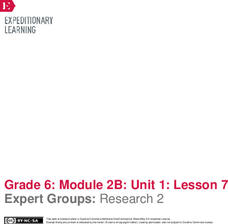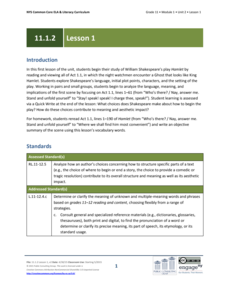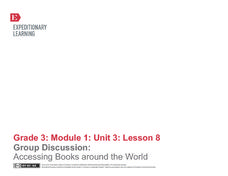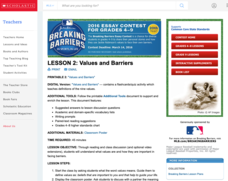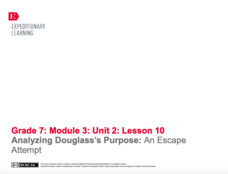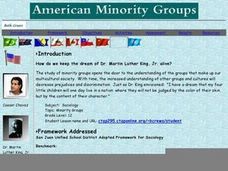EngageNY
Building Background Knowledge: Small-Group Work to Learn More about the History of Wars in Vietnam
Scholars take a close look at "The Vietnam Wars." They answer questions and discuss in groups to conclude that the author respects the Vietnamese. They participate in a modified jigsaw discussion and end the exercise with a quick writing...
EngageNY
Expert Groups: Research 2
Continue on. Scholars continue the research they began in their expert groups in instructional activity six. They read text and task cards from their research folders and share what they have gathered in research thus far. Individuals...
Philadelphia Museum of Art
Physics at the Art Museum: Kinetic Energy, Potential Energy, and Work
Connect science, math, and art for a true interdisciplinary activity! Learners explore simple machines in art. Through analysis with a physics app, they identify positions of kinetic and potential energy and make conclusions about work.
Curated OER
Using Random Sampling to Draw Inferences
Emerging statisticians develop the ability to make inferences from sample data while also working on proportional relationships in general. Here, young learners examine samples for bias, and then use random samples to make...
EngageNY
Grade 11 ELA Module 1: Unit 2, Lesson 1
How can an author's decisions impact a text? Using an insightful resource, scholars begin their study of Hamlet by reading Act 1.1. They explore the language, characters, and setting in small groups. Upon finishing group work, pupils...
EngageNY
Introducing Working Conditions in the Mills
Scholars discover how working in a textile mill in the nineteenth century affected the title character from Katherine Paterson's novel, Lyddie. Partners analyze quotes from the novel and then add evidence and questions about...
EngageNY
Grade 9 ELA Module 4, Unit 1, Lesson 8
In a close reading of "The Overseer" chapter from Sugar Changed the World, groups focus on the words Aronson and Budhos use to contrast the lifestyles of enslaved people and their enslavers. The whole class then engages in an...
EngageNY
Expert Groups: Research 1
Be a team player. Scholars gather in their expert groups and discuss group norms and roles. They look at their research topics and determine how they will divide the work among themselves. Groups look over their research folders and ask...
EngageNY
Grade 10 ELA Module 3: Unit 1, Lesson 13
Don't argue for the sake of argument. Scholars begin their work in lesson plan 13 and continue into lesson plan 14 as they analyze The Immortal Life of Henrietta Lacks. Working in groups, learners work toward collecting text evidence and...
EngageNY
Grade 9 ELA Module 3, Unit 2, Lesson 8
Learning about research can be as important as learning about the topic itself. As ninth graders continue their guided research projects from Temple Grandin's Animals in Translation, they discuss their possible inquiry paths with group...
Smithsonian Institution
Two Perspectives on the Battle of Little Bighorn/Greasy Grass
Learners understand why historians conduct research and the importance of perception when it comes to studying history. The resource covers The Wars of Expansion and the Battle of Little Bighorn/Greasy Grass through group work, debate,...
Institute of Electrical and Electronics Engineers
Working with Watermills
In collaborative groups, emerging engineers or environmental scientists plan and construct a water wheel or watermill that rotates for a total of three minutes. Everything you need to carry out this instructional activity is included:...
Scholastic
Voyage on the Mayflower for Grades 3-5
Following an online activity, scholars complete a Grafitti Wall in which small groups write words and phrases on chart paper pertaining to Pilgrims, the Mayflower, and Thanksgiving. Pupils perform a close reading then answer a series of...
EngageNY
Group Discussion: Accessing Books Around the World
Continue work with an informational text by following the procedures detailed here. The plan, part of a series, focuses on My Librarian is a Camel. Class members complete text-dependent questions and then prepare for and participate in a...
Ford's Theatre
Socratic Seminar/Group Discussion: The Crisis of the Civil War
High schoolers work in four different groups to examine the many factors that led to the American Civil War. They research an assigned topic, prepare questions, and finally engage in a class discussion using the Socratic Seminar method.
Texas Education Agency (TEA)
Working Cooperatively in a Social System
Using an informative resource, scholars view a PowerPoint about working cooperatively in a social system. Pupils then use their newfound knowledge to create a flowchart defining the systems of an organization.
EngageNY
Listening Closely and Taking Notes in Expert Groups: Colonial Trade Podcast
The twelfth instructional activity of this unit builds on the skills developed in the previous instructional activity, as fourth graders continue their quest to become experts on colonial trade by listening to interviews with historical...
Pace University
Grade 6-8 Living Things
What characterizes a living thing? Scholars explore the concept during a differentiated instruction unit on living things. They perform lab experiments to determine how animals adapt to stimuli, watch videos and learn about...
EngageNY
Setting Purpose for Research: What are Fair Working Conditions?
Life may not be fair but working conditions should be. Scholars research working conditions at Wegmans by studying the company website. They complete a working conditions anchor chart and discuss their findings in a think-pair-share...
Scholastic
Lesson 2: Values and Barriers
Scholars investigate and discuss the importance of values and how they can be used to break barriers. Small groups work collaboratively to examine the text and draw inferences to answer questions. A writing assignment challenges pupils...
EngageNY
Analyzing Douglass’s Purpose: An Escape Attempt
Time for more team work! Class members work in a team once again to complete Narrative of the Life of Frederick Douglass Excerpt 5 Analysis note catcher. Before beginning, teams review the Group Work anchor chart and roles....
EngageNY
Analyzing Douglass’s Purpose: Learning to Read
Three for three. Groups of three complete Analysis note catchers that cover excerpt three of Narrative of the Life of Frederick Douglass. Before beginning, learners discuss group work by looking at the excerpt analysis role document...
Dream of a Nation
Group Presentation Assignment
Rather than waiting for the world to change, encourage your class members to become agents of change with a project that asks groups to select an issue found in Tyson Miller's Dream of a Nation: Inspiring Ideas for a Better America....
Curated OER
American Minority Groups
Explore the contributions individuals have made in the lives of American minority groups. Twelfth graders write a five-page expository piece providing a social history, examples of discrimination, and patterns of assimilation for an...



